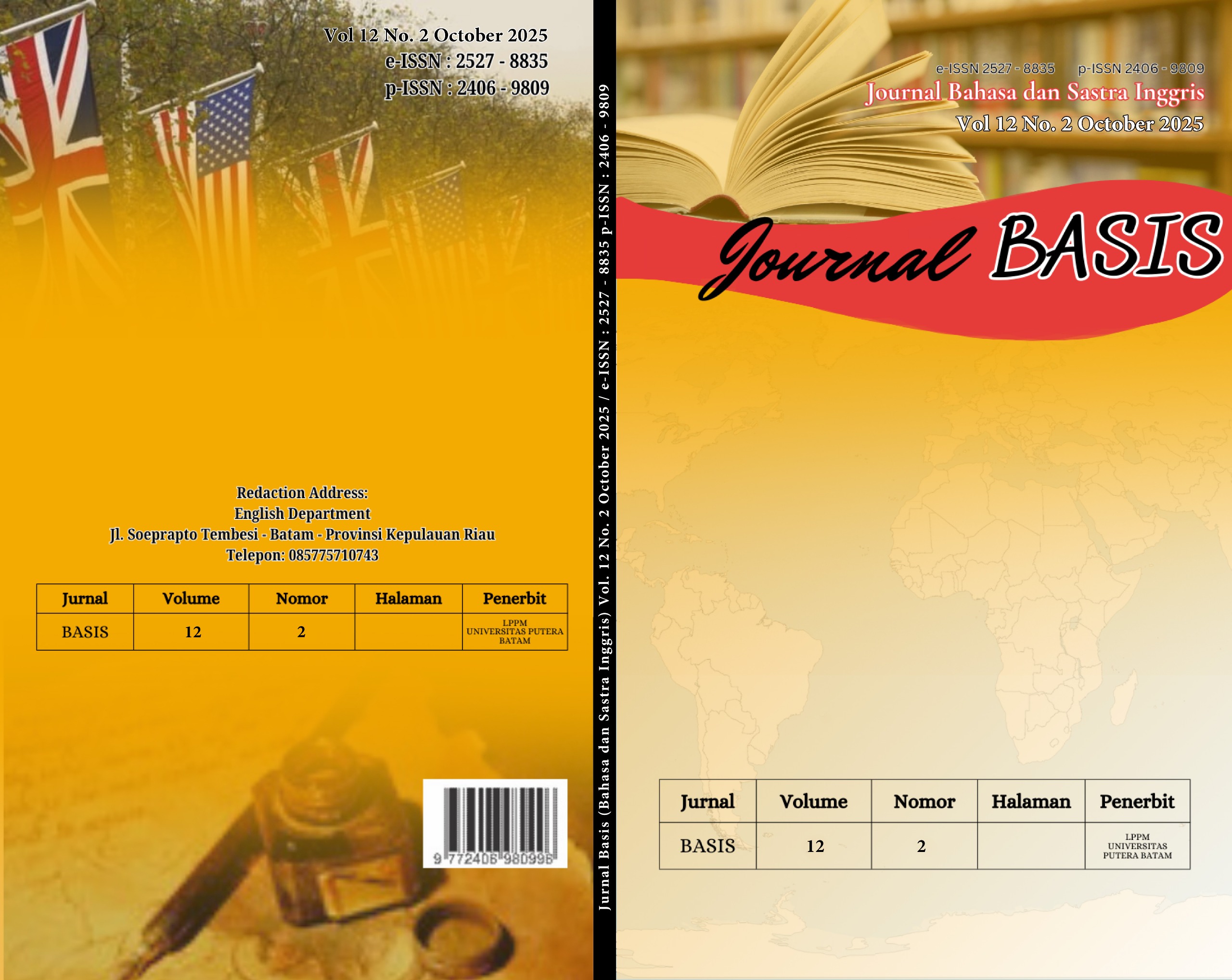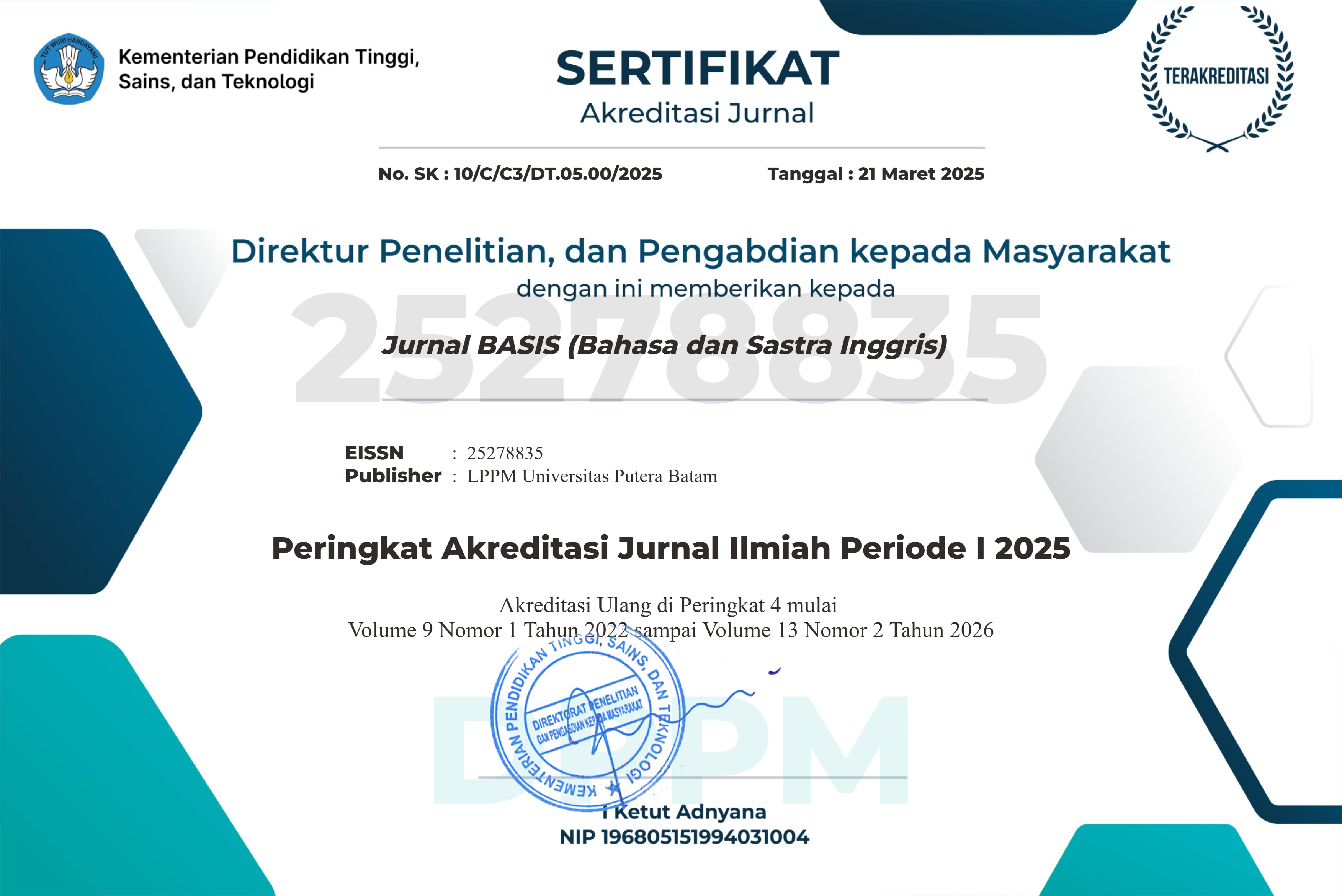WITH LOVE, YOURS TRULY: THE LANGUAGE OF SEDUCTION IN HENRY VIII’S LETTERS TO ANNE BOLEYN IN THE TUDORS SERIES
DOI:
https://doi.org/10.33884/basisupb.v12i2.9464Kata Kunci:
Seductive Language, Rhetorical Strategies, Henry VIII, Anne Boleyn, The TudorsAbstrak
Penelitian ini mengamati bagaimana strategi retorika digunakan dalam pertukaran surat antara Henry VIII dan Anne Boleyn dalam serial The Tudors. Dengan memakai teori rayuan Ballif, penelitian ini mengungkapkan tiga elemen kunci bahasa yang menarik perhatian: afektif, sombong, dan menggelikan. Metode kualitatif yang memadukan analisis teks dan gambar dengan teknik-teknik Spradley digunakan untuk menyelidiki cara Henry menggunakan bahasa dalam menyatakan kasih sayang, mempengaruhi perasaan, serta mengukuhkan kekuasaannya. Penemuan-penemuan tersebut melemparkan cahaya bahwa surat-surat dari Henry penuh dengan daya tarik emosional, ekspresi yang dramatis, dan strategi retorika untuk mempertegas kepemimpinannya sambil memikat hati Anne. Sebaliknya, tanggapan Anne disertai oleh sifat rendah hati dan kehati-hatian, yang mencerminkan perjalanan yang hati-hati dalam memahami dinamika kekuasaan di antara mereka. Hasil penelitian ini menemukan bahwa gaya bahasa yang digunakan oleh Henry dapat menyulap perbedaan antara kasih sayang yang murni dan tindakan manipulatif, sesuai dengan pandangan teori Ballif yang menyatakan bahwa daya tarik retorika dapat menggoyahkan kedua kriteria rasionalitas dan kebenaran. Penelitian ini memberikan pemahaman yang berharga mengenai hubungan yang kompleks antara cinta, kekuasaan, dan bahasa, yang menyoroti peran ganda rayuan sebagai alat personal dan politik.
Referensi
Ballif, M. (2001). Rhetorical Philosophy and Theory. Board of Trustees, Southern Illinois University.
Betteridge, T. (2016). The Tudors and the Tudor Court: Know Your Symptom. In W. B. Robison (Ed.), History, Fiction, and The Tudors: Sex, Politics, Power, and Artistic License in the Showtime Television Series (pp. 195–207). New York: Palgrave Macmillan US. https://doi.org/10.1057/978-1-137-43883-6_12
Butler, J. P. (1990). Gender Trouble: Judith Butler Feminism and Subversion of Identity. London: Routledge. https://www.researchgate.net/publication/331968201_Gender_Trouble_Feminism_and_the_Subversion_of_Identity
Frunza, S. (2017). Seduction, Communication and Leadership. Transylvanian Review, (XXVI), 137–149.
Garcia, E. E. (1987). Freud’s seduction theory. The Psychoanalytic Study of the Child, 42, 443–468. https://doi.org/10.1080/00797308.1987.11823500
Israëls, H., & Schatzman, M. (1993). The seduction theory. History of Psychiatry, 4(13), 23–59. https://doi.org/10.1177/0957154X9300401302
Kesselring, K. J. (2016). Crime, Punishment, and Violence in The Tudors. In W. B. Robison (Ed.), History, Fiction, and The Tudors: Sex, Politics, Power, and Artistic License in the Showtime Television Series (pp. 235–247). New York: Palgrave Macmillan US. https://doi.org/10.1057/978-1-137-43883-6_15
Kuppens, P., Tuerlinckx, F., Russell, J. A., & Barrett, L. F. (2013). The relation between valence and arousal in subjective experience. Psychological Bulletin, 139(4), 917–940. https://doi.org/10.1037/a0030811
Levin, C., & Paranque, E. (2016). The Significance of the King’s Children in The Tudors. In W. B. Robison (Ed.), History, Fiction, and The Tudors: Sex, Politics, Power, and Artistic License in the Showtime Television Series (pp. 115–126). New York: Palgrave Macmillan US. https://doi.org/10.1057/978-1-137-43883-6_6
Mullin, R. (2019). ‘You Think You Know a Story’: Reframing the Tudors on Television in the Twenty-First Century. Adaptation, 12(2), 89–104. https://doi.org/10.1093/adaptation/apy006
Severin, W. J., & Tankard, J. W. (2001). Communication Theories: Origins, Methods, and Uses in the Mass Media Fifth Edition PARTI. New York: Addison Wesley Longman.
Weir, A. (2008). Henry VIII: King and Court. Vintage.
Wray, R. (2010). Henry’s Desperate Housewives: The Tudors, the Politics of Historiography, and the Beautiful Body of Jonathan Rhys Meyers. In G. C. Semenza (Ed.), The English Renaissance in Popular Culture: An Age for All Time (pp. 25–42). New York: Palgrave Macmillan US. https://doi.org/10.1057/9780230106444_2
Zéhenne, C. (2021). Practice-based Study Seduction Against Production: A Playful Way of Creating Knowledge. The Journal of Media Art Study and Theory, 2(1). Retrieved from www.mast-journal.org













 JURNAL BASIS (BAHASA DAN SASTRA INGGRIS)
JURNAL BASIS (BAHASA DAN SASTRA INGGRIS)
